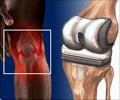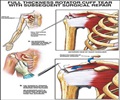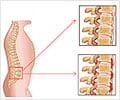The risk of superficial wound infection increased by nine percent for each one-unit increase in BMI in obese patients who underwent arthroplasty.

‘Increasing BMI increases the stress on the implant after a shoulder joint replacement surgery, leading to higher rates of mechanical implant failure.’





Their findings suggest that, above a certain level of obesity, complication risk increases steadily along with increasing body mass index (BMI). Complication Risks Increase Steadily with Higher BMI
The study included data on 4,567 shoulder arthroplasties performed between 1970 and 2013. Various shoulder arthroplasty procedures are performed to treat shoulder pain and loss of function resulting from arthritis or other conditions.
Forty-three percent of the shoulder arthroplasty patients were obese (defined as a BMI of 30 or higher). The researchers analyzed the relationship between BMI and different types of complications.
Overall, 302 patients needed revision surgery due to mechanical failure, loosening of the implant, or other causes. An additional 62 cases required a non-revision reoperation.
Advertisement
Higher BMI was also specifically associated with revision surgery for mechanical failure. For every one-unit increase in BMI after 30, there was a five percent increased risk of revision for mechanical failure.
Advertisement
In this population of shoulder-arthroplasty patients, obesity was not a risk factor for blood clot-related complications (thromboembolism), as it is for patients undergoing hip or knee replacement.
The rising prevalence of obesity--now present in more than one-third of US adults--has had a major impact on healthcare and related costs. Obese patients are at increased risk of several types of complications after total hip or knee replacement surgery.
Impaired Immune System Associated with Revision Surgery
The new study is among the first to assess how BMI affects the risk of complications after shoulder arthroplasty. This study is also unique in that it analyzes BMI in one-unit increments, rather than in ranges.
The results suggest that the risk of revision surgery and most other complications of shoulder arthroplasty increases along with BMI in obese patients.
"These findings support the notion that increasing BMI increases the stress on the implant, leading to higher rates of mechanical implant failure," Dr. Wagner and coauthors write.
They add that the increased infection risk is likely related to immune system changes and to "dead space" created by excess fatty tissue.
Dr. Wagner and colleagues believe their findings will help patients, physicians, and surgeons to make better-informed decisions about the relative risks and benefits of shoulder arthroplasty at different levels of BMI.
They discuss the implications of their findings for policy and research, including the need for further studies to modify the risks associated with increased BMI and studies helping to support the risk stratification for reimbursement, providing financial incentives for surgeons treating more complex and high-risk patients.
Source-Eurekalert















